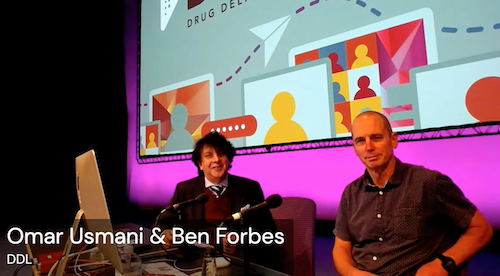Roy Pleasants of the University of North Carolina examined the difference between inhaler shelf life and inhaler user life, pointing out that we know very little about the latter because manufacturers consider data related to user life proprietary. He pointed out that most patients rely entirely on the expiration date printed on their inhaler’s package instead of the user life, which is the amount of time that the inhaler is considered viable once the packaging is opened. Reviewing a large number of commercial inhalers, he showed that the user life for some may be measured in weeks while the shelf life is measured in years meaning that patients may be relying on inhalers that are no longer capable of delivering the correct dose due to exposure to heat and humidity causing agglomeration, crystallization, and other changes to the drug. Among the things we don’t know, he noted, are the amount of drug left in the inhaler at the end of the user life and whether the manufacturers base the recommended user life on science or on commercial concerns.
Several presentations during the meeting specifically addressed the use of inhaled drugs to treat COVID-19, including a review of “Inhaled therapies for COVID-19” by Peter Barnes of the National Heart & Lung Institute at Imperial College London and a discussion of “Nebulizers and COVID-19: Aerosol Generation vs. Aerosol Dispersion” by Rajiv Dhand of the University of Tennessee, who explained best practices for the use of nebulizers to treat COVID-19 patients with minimal risk of transmission, a topic that he also addressed at the ISAM Congress. In addition, Jan de Backer of functional respiratory imaging (FRI) company Fluidda presented an explanation of “Functional Respiratory Imaging in times of COVID19”, which was similar to his talks at RDD 2021 and the 2021 ISAM Congress.
The Vectura/Philip Morris controversy
On the third day of the conference, Toby Capstick of the Leeds Teaching Hospitals NHS Trust confronted one of the year’s big controversies in his talk on “Inhalers and the tobacco industry – implications for practice, prescribers and patients.” Following news of the takeover of inhalation CDMO Vectura by tobacco giant Philip Morris International (PMI), a number of respiratory medicine organizations (including DDL) cut ties with Vectura, and some clinicians have called for a boycott on prescribing inhalers that provide revenue to Vectura. Capstick discussed the ethical considerations of such a boycott, which he notes would involve approximately one fifth of the inhalers prescribed in the UK.
“The tobacco industry is not a good industry,” Capstick stated, observing that PMI’s claims to want to move away from tobacco seem to be insincere based on their increasing sales of cigarettes and marketing of tobacco in other countries. However, he pointed out, a hardline boycott of inhalers associated with Vectura would punish patients and pharmaceutical companies who have nothing to do with the tobacco companies. The proposal with the least collateral damage, he suggested, would be to prescribe alternate inhalers to new patients and to inform current patients about the issues to allow them make their own decision whether or not to switch to a different inhaler. “At the end of the day,” he said, “the patient is the one using their inhaler, and it’s not their fault that their inhaler might have this association with the tobacco industry; and above all, we need to do what’s right for the patient.”



